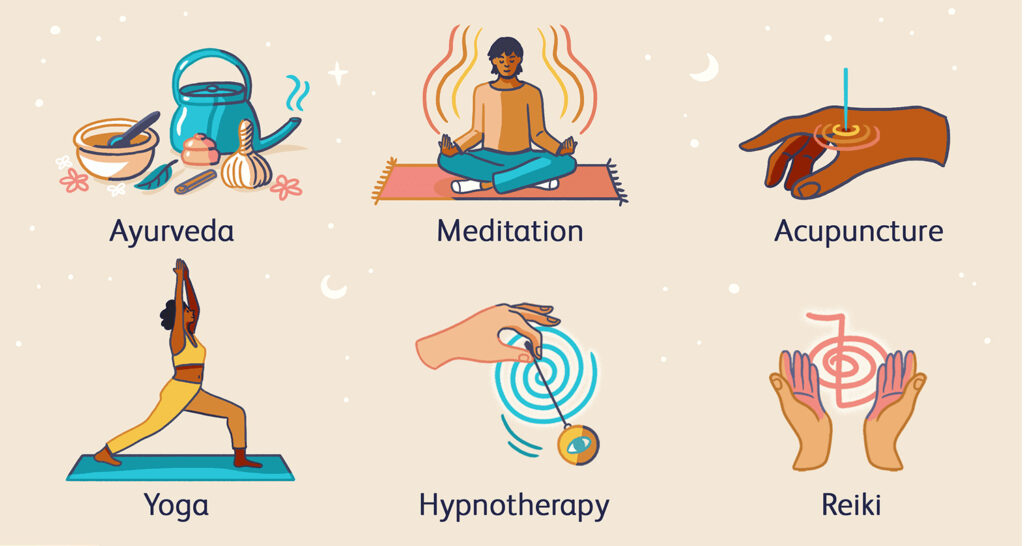Welcome to a transformative journey towards well-being, where we explore the art of harmonizing health through holistic practices. In today’s fast-paced world, finding balance is essential. ‘Harmonizing Health’ is your gateway to discovering the profound benefits of holistic wellness, including practices like yoga, meditation, and mindfulness. This blog is your compass to embrace a more fulfilling and healthier lifestyle by understanding the importance of a holistic approach to well-being.
Yoga and Its Mind-Body Connection

Yoga, an ancient practice with roots dating back thousands of years, is a holistic discipline that goes beyond physical postures and transcends into the realms of the mind and spirit. Its history is a tapestry of diverse traditions and philosophies, from the classical yoga of Patanjali’s Yoga Sutras to the spiritual path of Bhakti yoga.
Various styles, including Hatha, Vinyasa, Ashtanga, and Kundalini, offer unique approaches to achieving physical and mental harmony. What sets yoga apart is its profound mind-body connection. Through the practice of asanas (postures), pranayama (breath control), and meditation, yoga fosters a profound union between the physical and mental aspects of our existence.
It cultivates flexibility and strength in the body while promoting relaxation and mindfulness in the mind. This symbiotic relationship between body and mind not only enhances physical health but also brings inner peace, stress reduction, and emotional balance, making yoga a powerful tool for holistic well-being.
Meditation and Stress Reduction

Meditation, an ancient practice with profound implications for modern well-being, is a powerful tool for reducing stress, enhancing mental clarity, and promoting relaxation. Numerous scientific studies have illuminated the positive impact of meditation on our mental and physical health. By engaging in mindfulness meditation, individuals can effectively alleviate stress by calming the mind and reducing the production of stress hormones like cortisol.
This practice fosters mental clarity by sharpening focus, improving attention span, and boosting cognitive function. Moreover, meditation promotes relaxation by inducing a deep state of calm and tranquility, which can reduce anxiety and enhance one’s overall sense of peace. Whether through guided sessions, mindfulness techniques, or focused breathing exercises, meditation offers a pathway to reducing stress and achieving mental clarity while fostering a profound sense of relaxation. It is a holistic approach that empowers individuals to navigate life’s challenges with poise and serenity.
Nutrition and Holistic Eating

Significance of Mindful Eating, Organic Foods, and Balanced Nutrition in Holistic Wellness
Nutrition and holistic eating play a vital role in promoting overall well-being. Here’s a brief insight into the significance of mindful eating, organic foods, and balanced nutrition in holistic wellness:
- Mindful Eating: Mindful eating involves being present and fully engaged in the eating experience. It encourages savoring each bite, recognizing hunger and fullness cues, and avoiding distractions. This practice can lead to healthier food choices and better digestion.
- Organic Foods: Organic foods are grown without synthetic pesticides, fertilizers, or genetically modified organisms. They are free from harmful chemicals, making them a healthier choice. Organic foods are believed to have higher nutrient content and are better for the environment.
- Balanced Nutrition: A balanced diet includes a variety of nutrients such as carbohydrates, proteins, fats, vitamins, and minerals. It ensures that your body gets the necessary fuel for optimal functioning. Balancing macronutrients and micronutrients is essential for overall health.
In holistic wellness, the connection between physical, mental, and emotional well-being is recognized. By practicing mindful eating, incorporating organic foods, and maintaining a balanced diet, individuals can support their holistic health and achieve a state of well-rounded well-being.
Physical Activity and Exercise: Role in Achieving Holistic Health

- Physical activity and exercise play a crucial role in achieving holistic health, encompassing mental, emotional, and physical well-being.
- Cardio Workouts: Cardiovascular exercises like running, swimming, and cycling enhance heart health, increase lung capacity, and boost overall endurance. These workouts help reduce the risk of chronic diseases, improve mood, and promote weight management, contributing to holistic well-being.
- Strength Training: Strength training exercises, including weightlifting and bodyweight workouts, build muscle, enhance bone density, and support a healthy metabolism. A strong body helps prevent injuries, supports daily activities, and fosters a sense of confidence and empowerment.
- Holistic Health: Engaging in regular physical activity not only improves physical health but also has profound effects on mental and emotional well-being. Exercise releases endorphins, reducing stress, anxiety, and depression. It fosters mindfulness and a sense of balance in holistic health.
To achieve holistic health, it’s essential to incorporate a balanced mix of cardio and strength training into your routine. A combination of these exercises promotes physical fitness, mental clarity, and emotional stability, contributing to a well-rounded state of well-being.
Natural Healing Modalities

Natural healing modalities encompass a range of complementary therapies that emphasize holistic well-being and traditional practices.
- Acupuncture: An ancient Chinese practice involving the insertion of fine needles into specific points on the body. It’s believed to stimulate energy flow and promote healing. Acupuncture is commonly used for pain management, stress reduction, and various health issues.
- Aromatherapy: A practice that utilizes essential oils extracted from plants to promote physical and psychological well-being. These aromatic oils are often inhaled or applied topically. Aromatherapy is known for its calming, energizing, and mood-enhancing effects.
- Herbal Medicine: Herbal remedies involve the use of plant-based substances for healing purposes. It’s an integral part of traditional medicine systems worldwide. Herbs are used to address various health concerns, from digestive issues to sleep disorders.
- Meditation: While not an external therapy, meditation is a natural healing modality that focuses on mental and emotional well-being. It encourages relaxation, stress reduction, and enhanced self-awareness.
- Massage Therapy: Therapeutic massage involves manipulating soft tissues to relieve muscle tension, improve circulation, and promote relaxation. Various techniques, such as Swedish and deep tissue massage, are used for different purposes.
- Chiropractic Care: Chiropractors use manual adjustments to the spine and musculoskeletal system to alleviate pain and improve overall health. It’s often sought for back and neck pain, as well as spinal health.
- Homeopathy: This modality is based on the principle of “like cures like.” Homeopathic remedies use highly diluted substances to stimulate the body’s innate healing abilities. It’s used for various ailments, from allergies to colds.
- Energy Healing: Practices like Reiki and Healing Touch aim to balance the body’s energy fields. Practitioners use gentle touch or visualization to promote relaxation and healing.
Natural healing modalities are diverse, focusing on a holistic approach to health and well-being. Individuals often turn to these therapies to complement conventional medical treatments and promote a balanced lifestyle.
Mental Health and Emotional Resilience

Mental health and emotional resilience are crucial aspects of overall well-being.
- Mental Health: Mental health refers to your emotional, psychological, and social well-being. It’s essential for managing stress, building healthy relationships, and making informed choices. Nurturing mental health involves recognizing and addressing issues like anxiety, depression, or stress. Seeking help when needed and practicing self-care are fundamental to maintaining good mental health.
- Emotional Resilience: Emotional resilience is the ability to adapt to life’s challenges and bounce back from adversity. It’s about developing coping strategies and a positive mindset. Resilience can be cultivated through techniques like mindfulness, problem-solving, and seeking social support. Resilient individuals are better equipped to handle stress and recover from setbacks.
- Importance: Nurturing emotional well-being and building resilience is critical for several reasons. It enhances one’s ability to handle life’s ups and downs, reducing the risk of mental health issues. Resilience fosters better decision-making, problem-solving, and the capacity to adapt to change. Additionally, it strengthens relationships and fosters a sense of purpose.
- Ways to Promote Emotional Resilience: To build emotional resilience, consider regular exercise, a balanced diet, adequate sleep, and stress management techniques. Engaging in activities you enjoy, maintaining a support network, and seeking professional help when needed can contribute to emotional well-being.
- Reducing Stigma: Discussing mental health openly helps reduce the stigma associated with seeking support. It encourages individuals to prioritize their emotional well-being without fear of judgment.
- Seeking Professional Help: If you or someone you know is struggling with mental health issues, don’t hesitate to seek professional help. Mental health professionals can provide guidance and support on the journey to better emotional well-being and resilience.
In short, nurturing emotional well-being and building resilience are vital for leading a fulfilling and balanced life. They empower individuals to face life’s challenges with strength and positivity.
Spirituality and Connection

Spirituality and Connection play a significant role in holistic wellness and personal growth.
- Spirituality and Holistic Wellness: Spirituality is a deeply personal experience that involves a sense of connection to something greater than oneself. It can be religious or non-religious and often contributes to holistic wellness. Spirituality fosters inner peace, purpose, and a sense of belonging. It provides a framework for understanding life’s challenges and finding meaning in them.
- Connection to Self: Spiritual practices often involve self-reflection, meditation, or mindfulness. These practices help individuals connect with their inner selves, understanding their desires, values, and goals. This self-connection is foundational for personal growth.
- Connection to Others: Spirituality often promotes a sense of unity with others, fostering empathy, compassion, and cooperation. These connections are vital for emotional well-being and personal development.
- Role in Personal Growth: Spirituality offers guidance and a moral compass for making ethical choices. It encourages individuals to seek personal growth through self-improvement, resilience, and a commitment to inner values.
- Enhanced Resilience: Spirituality often helps individuals cope with adversity, providing a source of strength and hope during challenging times. This resilience is valuable for personal growth and well-being.
- Mind-Body Connection: Many spiritual practices, such as yoga or meditation, emphasize the mind-body connection. These practices can lead to improved physical health, reducing stress, and promoting holistic wellness.
- Finding Meaning: Spirituality can provide individuals with a sense of purpose and meaning in life, driving personal growth by inspiring them to pursue their passions and contribute to the greater good.
Spirituality and connection are integral to holistic wellness and personal growth. They empower individuals to cultivate a deeper understanding of themselves, foster connections with others, and find meaning and purpose in their lives.
Conclusion
In conclusion, the holistic path to wellness is a symphony of mind, body, and spirit. By embracing each of these facets, you’ll find yourself on a journey of self-discovery, self-care, and profound connection. It’s a path that leads not just to health but to a life well-lived. Embrace the holistic path to wellness, and let it be your guide to a healthier, happier you.
